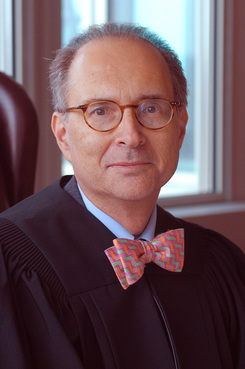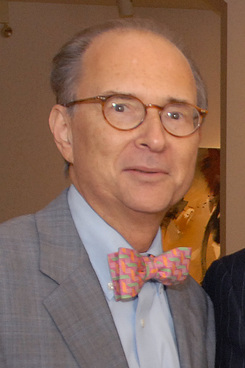Barry Kamins

June 01, 2018 | New York Law Journal
'DeBour' Faces Increased Criticism: Where Do We Go From Here?In this article on Criminal Law and Procedure, Barry Kamins looks at criticism of 'People v. DeBour,' the case establishing the level of intrusion allowed during police encounters with citizens.
By Barry Kamins
12 minute read

March 30, 2018 | New York Law Journal
Is 'Ingle' on Life Support After 'Robinson' and 'Whren'?Criminal Law and Procedure columnist Barry Kamins writes: What is the correct legal standard under which a police officer may stop a motor vehicle in New York State for a traffic violation? While that is a straightforward question, the answer remains elusive based on several decisions from the New York Court of Appeals and the U.S. Supreme Court.
By Barry Kamins
6 minute read

February 02, 2018 | New York Law Journal
DiFiore Court Strives to Protect Rights of DefendantsCriminal Law and Procedure columnist Barry Kamins writes: Several recent decisions clearly signal the DiFiore court's continuing commitment to protecting defendants from wrongful convictions and protecting constitutional rights in criminal cases.
By Barry Kamins
10 minute read

October 18, 2017 | New York Law Journal
New Criminal Justice Legislation: Part TwoIn his Criminal Law and Procedure column, Barry Kamins picks up with the second part of his review of new criminal justice legislation.
By Barry Kamins
23 minute read

October 06, 2017 | New York Law Journal
New Criminal Justice Legislation: Part OneIn his Criminal Law and Procedure column, Barry Kamins presents a review of new legislation amending the Penal Law, Criminal Procedure Law and other related statutes. His discussion highlights key provisions of the new laws.
By Barry Kamins
21 minute read

August 04, 2017 | New York Law Journal
Expanding the 'Wade' Hearing: New Police Identification ProtocolsCriminal Law and Procedure columnist Barry Kamins reviews the new best practices for identification procedures by witnesses, which reflect the results of substantial scientific research in the area of memory, perception and recall.
By Barry Kamins
15 minute read

June 02, 2017 | New York Law Journal
'U.S. v. Wade' Turns 50: New Era in Eyewitness IdentificationCriminal Law and Procedure columnist Barry Kamins writes: Long before the term "wrongful conviction" became commonplace, the U.S. Supreme Court in 1967 noted the conclusion by one commentator that "the influence of improper suggestion upon identifying witnesses probably accounts for more miscarriages of justice than any other single factor—perhaps it is responsible for more such errors that all other factors combined." Fifty years later, New York is about to embark on a new era of eyewitness identification.
By Barry Kamins
15 minute read

April 03, 2017 | New York Law Journal
Court of Appeals Expands the Co-Conspirator ExceptionIn his Criminal Law and Procedure column, Barry Kamins discusses a case of first impression in which the New York Court of Appeals expanded the co-conspirator's exception to the hearsay rule. The court held that, subject to certain conditions, a statement made by a co-conspirator of a defendant, prior to the defendant's joining the conspiracy or after the defendant's active involvement has ceased, is admissible when offered to prove the conspiracy or the object crime.
By Barry Kamins
15 minute read

February 03, 2017 | New York Law Journal
Community Caretaking: New Doctrine for Court of AppealsIn his Criminal Law and Procedure column, Barry Kamins writes: The New York Court of Appeals has recently upheld the towing, impoundment and inventory search of an automobile, holding that these actions were, under the facts of the case, consistent with a "community caretaking function." This is the first time the court has adopted this theory, although it has made oblique references to it in the past. What is the origin of this doctrine and, more importantly, what are its boundaries and scope?
By Barry Kamins
13 minute read

December 02, 2016 | New York Law Journal
Reviewing Credibility of Police Officer TestimonyIn his Criminal Law and Procedure column, Barry Kamins explores suppression where the People have not sustained their initial evidentiary burden. While in the overwhelming number of suppression hearings, prosecutors are able to satisfy their burden of going forward with testimony that is found to be credible by the suppression court, in two recent cases suppression courts did not credit the testimony of police officers who testified that they were able to smell the odor of marijuana emanating from a vehicle that they had stopped.
By Barry Kamins
17 minute read
Trending Stories
- 1Call for Nominations: Elite Trial Lawyers 2025
- 2Senate Judiciary Dems Release Report on Supreme Court Ethics
- 3Senate Confirms Last 2 of Biden's California Judicial Nominees
- 4Morrison & Foerster Doles Out Year-End and Special Bonuses, Raises Base Compensation for Associates
- 5Tom Girardi to Surrender to Federal Authorities on Jan. 7
More from ALM
- Scan In Progress: Litigators Leverage AI to Screen Prospective Jurors 1 minute read
- Legal Speak at General Counsel Conference East 2024: Match Group's Katie Dugan & Herrick's Carol Goodman 1 minute read
- Legal Speak at General Counsel Conference East 2024: Eric Wall, Executive VP, Syllo 1 minute read



